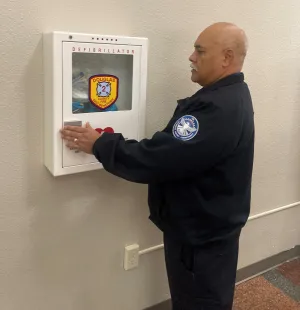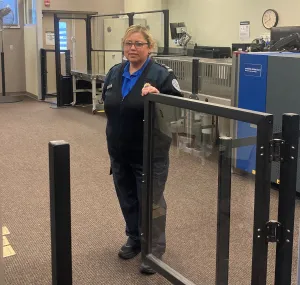 EAT STSO Alan Holiman (Photo by Roselia Ortiz)
EAT STSO Alan Holiman (Photo by Roselia Ortiz)
When a passenger suddenly became ill in the boarding area of Pangborn Memorial Airport (EAT) in Wenatchee, Washington, an airline gate agent knew exactly who to call for help – Supervisory TSA Officer Alan Holiman.
Travelers were boarding a flight to Seattle when the gate agent noticed a man lying on the floor unconscious. The agent quickly waved to Holiman, who raced to the gate to assist.
Holiman noticed the man was breathing but not responding when Holiman tried to wake him.
“I didn’t know if he was just sleeping deeply or intoxicated or what may be happening, so it was fairly routine at this point to say, ‘Hey, what’s going on with this guy?’” Holiman recalled. “We have a really good working relationship with gate agents here, so it wasn’t surprising she asked me to assist. They know we’re there to help if they need us.”
Holiman quickly remembered that during security screening, he overheard the traveler mention he was wearing a blood glucose monitor. Holiman was concerned the man might be suffering from a serious medical condition, so he immediately called 911.
“Knowing he had a glucose issue helped, because immediately after he didn’t wake up, I knew there was a possibility of a diabetic coma, which can lead to death fairly quickly,” Holiman said. “I was able to relay that to the 911 operator and the ambulance crew. There are emergency glucose shots for people experiencing severe hypoglycemia, so I wanted them to know the situation so they could have those ready if needed.”
While on the phone with emergency dispatch, it appeared the man stopped breathing. The operator urged Holiman to begin CPR, and it worked despite Holiman’s minimal medical training. The traveler began to respond and breathe normally.
“I don’t have a medical background; I haven’t been CPR-certified since high school,” Holiman noted. “I’ve done enough incident reports at the checkpoint to be good at communicating quickly on the phone, directing people around me and working with my hands at the same time.”
When the airport’s fire department arrived and took over the emergency medical response, TSA Officer Salvador Quintoriano quickly raced to retrieve one of the airport’s automated external defibrillators. Quintoriano was the officer who conducted a pat-down on the passenger after the man said he had a medical monitor.
“It took everyone communicating with each other,” said Quintoriano. “Everyone reacted in a calm and professional matter and did their part, responding to and assisting with the incident and keeping the checkpoint secure.”
The teamwork was evident! Holiman and Lead Officer Tye Overbey worked together to clear the airport seating area so paramedics had a clear path to the traveler, and Supervisory Officer Roselia Ortiz quickly escorted the first responders past the security checkpoint so they could help the ill passenger.
“Clearing the seating for the paramedics was very important,” Overbey emphasized. “Seconds count when we don’t know the severity of the issue with the passenger and trying to move a gurney with equipment on it around all of the seating. Teamwork and communication are essential when you have any kind of emergency. Thankfully, we have some of the best teamwork at this airport between TSA officers, airline staff and emergency responders.”
As you might expect, time was ticking, and officers didn’t have any seconds to spare to screen medics at the checkpoint before allowing them past the security checkpoint.
“In a case like this, a supervisory officer will escort emergency personnel (past the security checkpoint), and we stay with them until they leave,” said Ortiz. “I am very proud of the EAT team and their professional, compassionate and caring attitude.”
We’re pleased to report the passenger quickly recovered and flew out of EAT the next day.
Pangborn Memorial Airport has just two flights a day, but the TSA team there is dedicated to protecting the traveling public anyway they can.
“All of us, as TSA employees, truly care about our passengers,” said TSA Manager Andy Rheaume. “We see many stories on the TSA intranet showing us jumping in to help someone in distress. This team in Wenatchee is special for that same reason. Without hesitation, they jumped in to save a life. Alan is always cool and calm, so for him to not hesitate and start CPR does not surprise me. That’s Alan.”
Washington TSA Federal Security Director Greg Hawko was also impressed and not surprised by TSA EAT’s quick response.
“It comes as no surprise to me that when something out of the ordinary happens at an airport, TSA officers are frequently the first people members of the airport community turn to for assistance,” said Hawko. “Officers’ familiarity with operations, their ability to anticipate what may be needed and their leadership skills shine during times of crisis. I am proud of the job the EAT TSA team did to assist a traveler in need. They are valued members of their community, and I thank them for their selfless actions.”
Holiman encourages all of us to be ready to help others when needed, even administering CPR. It could save a life, and he knows first-hand.
“Hands-Only CPR is simple and effective, even if you aren’t certified and haven’t had a class,” he said. “If there is no one around who is certified, and someone needs CPR, you shouldn’t be scared to try to help.”
Holiman also appreciates the great team around him.
“I’m proud of my team, and I appreciate all they did to help the situation have a good outcome. I’m really lucky to have a great group of officers here.”
By Don Wagner, TSA Strategic Communications & Public Affairs


